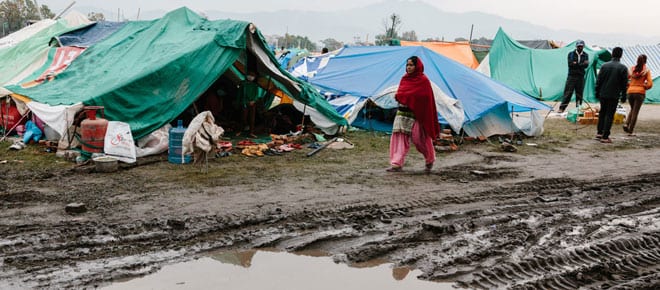A bottleneck of people and supplies at Nepal’s Kathmandu airport combined with nationwide fuel shortages, blocked roads and difficult terrain is hampering the efforts of aid agencies and emergency services to reach earthquake survivors, warns Oxfam today.

A bottleneck of people and supplies at Nepal’s Kathmandu airport combined with nationwide fuel shortages, blocked roads and difficult terrain is hampering the efforts of aid agencies and emergency services to reach earthquake survivors, warns Oxfam today.
| Listen to today’s Morning Report report featuring an interview with Oxfam’s Lisa Rutherford describing the conditions and desperate need. |
The international agency says there are huge challenges in getting help to the tens of thousands of people without adequate shelter, food and water, especially to rural communities on the steep slopes that cover much of Nepal, many connected to the outside world by a single dirt road that may now be blocked by landslides. To get round this, Oxfam is looking at ways to transport essential goods overland from India. Heavy rainfall is also a problem, making life miserable for those camping outdoors and putting vulnerable people’s health at risk.
Oxfam is stepping up its relief effort and aims to support 350,000 people. It is already providing clean water and toilets in two makeshift camps in the Kathmandu Valley and looking at how to work with other agencies to provide clean water to more than 34,000 people living in all 16 open-air sites set up by the Government of Nepal.
Oxfam’s response team from India have arrived in Gorkha, one of the worst affected areas, and begun assessing the level of need in the villages, while another team has left for the remote Sinhdupalchowk region to begin assessing needs. Over the coming days, it is also aiming to explore how to provide food and shelter to survivors and to send teams to more remote districts.
More than 5 tons of water and sanitation materials have been dispatched from Oxfam’s warehouse in Barcelona to help those hit by the crisis.
The earthquake and series of aftershocks have killed more than 4,300 people and injured 8,000, with the death toll continuing to rise. The UN estimates that 8 million people across the country have been affected by the disaster – almost twice the population of New Zealand.
Speaking from Kathmandu, Oxfam’s Humanitarian Manager, Orla Murphy, said:
“Oxfam is already reaching tens of thousands of earthquake survivors in camps across Kathmandu but it’s vital that we can also get shelter, water and food to the huge numbers of people in hard-to-reach rural areas.
“Blocked roads, fuel shortages and supplies being held up at Kathmandu airport pose a big challenge for Oxfam and others. We’re doing everything we can to get our teams to the affected areas to assess what’s needed and get help to vulnerable people who need it as soon as possible.”





